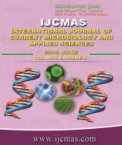


 National Academy of Agricultural Sciences (NAAS)
National Academy of Agricultural Sciences (NAAS)

|
PRINT ISSN : 2319-7692
Online ISSN : 2319-7706 Issues : 12 per year Publisher : Excellent Publishers Email : editorijcmas@gmail.com / submit@ijcmas.com Editor-in-chief: Dr.M.Prakash Index Copernicus ICV 2018: 95.39 NAAS RATING 2020: 5.38 |
Human Immunodeficiency Virus (HIV) infection and its end stage, Acquired Immunodeficiency Syndrome (AIDS), is an extremely serious problem worldwide. HIV seropositive patients with CD4 T cell count < 200 cells/μl have reported an excess risk of diarrhoea. The present study was undertaken in the at Dr. S.C.G.M.C, Nanded between November 2015 and October 2017 to identify Opportunistic Intestinal parasites in HIV positive patients presenting with or without diarrhoea and their association with CD4 T cell count. Newly diagnosed 300 patients with HIV infection confirmed by serology were included and divided into two groups Diarrhoeal and non-diarrhoeal. CD4 T lymphocyte cell count was estimated using Flow-Cytometry. Stool specimens were collected from all the patients and examined macroscopically and microscopically. We found that intestinal parasites in subjects with diarrhoea were significantly higher than without diarrhoea. Cryptosporidium sp. was the most common parasite detected. Intestinal parasites were found to be more common in HIV seropositive patients with CD4 cell count < 200 cells/μl. Thus, routine screening of the stool samples of HIV seropositive patients with diarrhoea should be done for prompt patient care and prevent the emergence of fulminant form of the disease.
 |
 |
 |
 |
 |